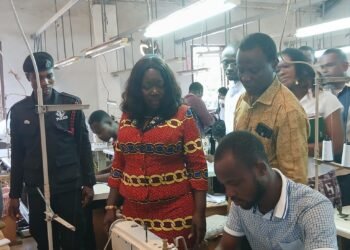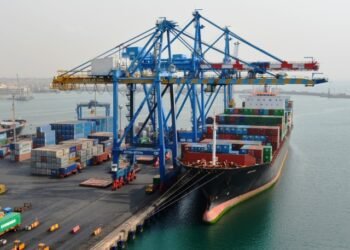Robert Ahomka Lindsay, a former Deputy Minister for Trade and Industry, has called on Ghanaians to purchase fast moving consumer goods.
According to him, their decision to buy Made in Ghana goods will help businesses to sustain their growth.
Mr Ahomka Lindsay further noted that, people often rely on imported products because they are brought into the country by retailers. This, he explained, poses risk to the thriving of indigenous manufacturers.
The former deputy Trades minister speaking on the theme: ‘Promoting made-in-Ghana products to spur inclusive economic growth’, revealed that indigenous products have the possibility of becoming dominant in the country.
Mr Ahomka Lindsay believes this can only be achieved provided the focus is shifted to fast-moving consumer goods.
“Fast-moving consumer goods are designed because we use them every day. They are designed because they are sold by retailers and to consumers all the time. In Ghana… our challenge is that we retail products that are manufactured outside our home, so it will greatly help if we can tap in and focus on the fast-moving consumer goods”.
Additionally, he encouraged local manufacturers to not get complacent in product development. However, he advised them to rather incorporate versatility in their range of products.
Furthermore, Mr Ahomka Lindsay revealed that producing different products would increase market size and rake in more profit for local producers.
Versatility in manufacturing industry
Citing the varying range of goods produced from cocoa, Mr Ahomka Lindsay called for an increase in production of goods to ensure optimum returns on value.
“Our range of goods that are available must be increased. I would encourage Ghanaian manufacturers to look at producing other fast-moving consumer goods range every year; so we can make millions of dollars from them. If you look at the top 500 richest companies in the world, you’ll be shocked how many fast-moving consumer goods you find.”
Mr Ahomka Lindsay further advised Ghanaian manufacturers to re-assess the entire value chain of their business. He insisted that this will ensure that their products are readily available on the market to meet consumer demands.
“We need to make sure that we are reliable. When we say we are producing 10 cartons of juice every day, we get it every day. That means a review of our value chains to ensure that we have enough pineapple, for instance, for the Eku juice to be produced”.
Buying made-in Ghana goods
Earlier this month, the Chief Executive Officer of Royal Vina Foods, Madam Davina Sheila Mensah, urged Ghanaians to patronize locally manufactured food products. According to her, this will help in building a stable and robust local economy.
Madam Mensah further explained that commodities such as rice creates a huge challenge as the country spends a hefty sum in importing.
“We import a lot of foreign rice and it cost us a lot. It is also a contributing factor for the high exchange rate because we have to change the money to other currencies and it makes our economy a bit unstable. Let’s advocate for made-in-Ghana foods”.
Madam Mensah underscored the need for state officials to outrightly support the patronage of ‘made-in-Ghana Products’.
Furthermore, she encouraged financial institutions to support local manufacturers to help create jobs.
Read Also: BoG issues directive on the treatment of Captured Payment Cards in ATMs























